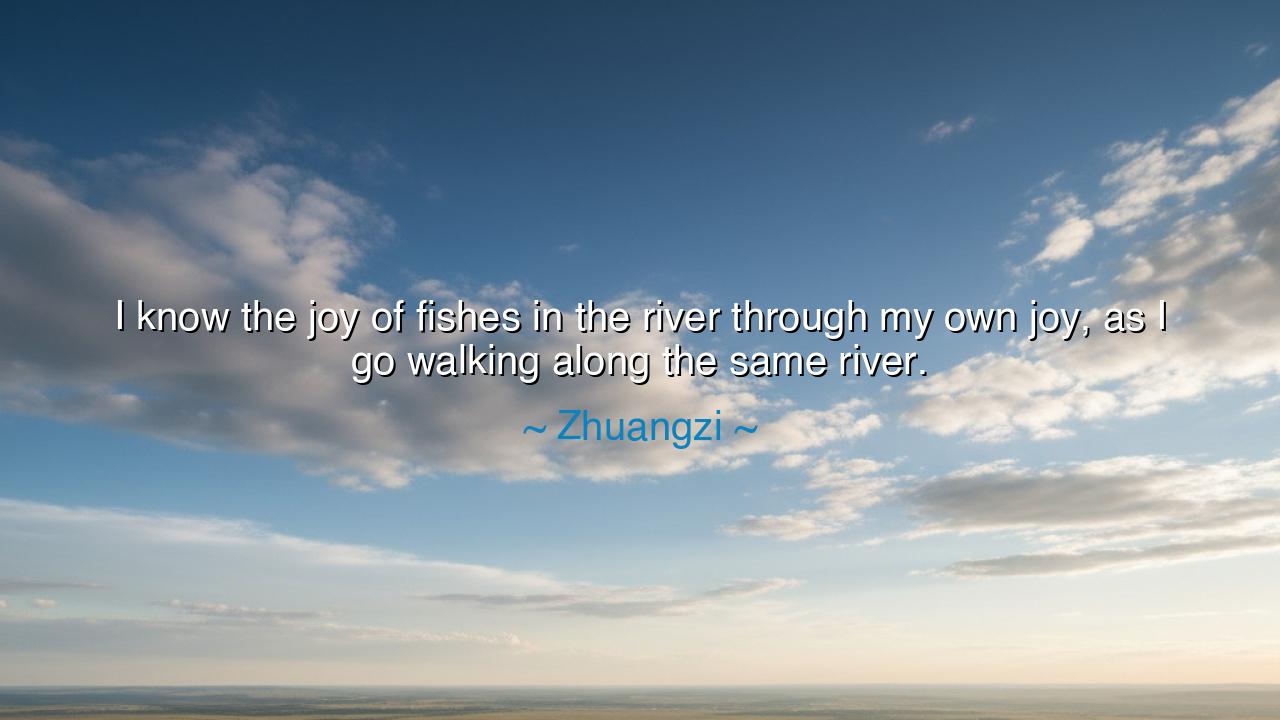
I know the joy of fishes in the river through my own joy, as I go
I know the joy of fishes in the river through my own joy, as I go walking along the same river.






Hear now the words of Zhuangzi, the sage of ancient China, whose laughter still echoes across the centuries: “I know the joy of fishes in the river through my own joy, as I go walking along the same river.” These words, at first gentle and poetic, are in truth a river of wisdom flowing from the deep spring of Taoist philosophy. For in them lies a mystery — the mystery of empathy, of harmony, and of the unity between all living things. To those who hear only with the ears, the saying seems a riddle; but to those who listen with the heart, it is a revelation.
The story tells that Zhuangzi walked with his friend Huizi along the banks of the Hao River. As they gazed upon the fish darting joyfully through the current, Zhuangzi said, “See how the fishes enjoy themselves in the water!” Huizi, the logician, challenged him: “You are not a fish. How do you know the joy of fish?” And Zhuangzi, smiling, replied: “You are not I. How do you know that I do not know the joy of fish?” In that playful exchange, he taught not through argument but through insight — that true understanding does not come from analysis or separation, but from oneness.
For Zhuangzi, the world was not divided into observer and observed, self and other. To him, all beings flowed together in the great current of the Tao — the Way of Nature, the infinite pattern that moves through all life. When he spoke of knowing “the joy of fishes,” he spoke of that deep harmony where boundaries dissolve, and one being feels the heartbeat of another as its own. The joy of the fish in the river was not separate from his own joy; it was reflected, mirrored, shared. He understood that to feel the life around us — to sense its rhythm and beauty — is to participate in something vast and sacred.
In our modern world, men have become like Huizi, forever analyzing, dividing, and questioning, believing that knowledge must come through distance and proof. But Zhuangzi reminds us that the truest knowledge is born not from separation, but from connection. The mother knows her child’s hunger not by words but by intuition. The lover senses the other’s sorrow before a tear is shed. The artist knows the soul of the landscape not by measuring its width and depth, but by losing himself within its colors. So it is with the joy of the fishes — it is a knowing that arises not from thought, but from being.
Consider the story of Jane Goodall, who lived among chimpanzees in the forests of Gombe. The scientists of her time told her that to study animals objectively, she must keep herself detached — to observe as an outsider, without emotion. Yet she refused. She watched not as a distant scholar, but as a companion. Over time, she came to understand the chimps’ play, their affection, their grief — their joy. She did not merely record their behavior; she felt their lives. Like Zhuangzi by the river, she knew them through her own joy in their presence. And in doing so, she transformed our understanding of what it means to share this earth with other beings.
Zhuangzi’s teaching, then, is not about fish alone — it is about awakening to the interconnectedness of all life. He invites us to look upon the world not as a collection of separate things, but as a single, breathing organism. When we walk beside the river, the wind that touches our skin is the same that ripples the surface. When the bird sings, its song enters our chest, and our heart keeps time with its rhythm. To know the joy of the fish is to rediscover the forgotten unity between man and nature, self and cosmos, spirit and matter.
So let this be your lesson: when you walk through the world, do not see yourself as apart from it. Listen — not only with the mind but with the soul. Feel the pulse of life in all that moves and breathes. Sit beside the stream and let its laughter become your own. Stand beneath the stars and recognize them not as distant fires, but as ancient kin. The joy of fishes, the whisper of leaves, the silence of mountains — all are reflections of the same truth: that happiness and wisdom arise when we cease trying to master life and instead become part of its dance.
Thus spoke Zhuangzi, the poet of the Tao, who found enlightenment not in temples or scrolls, but in the rippling of a river and the freedom of a fish. His laughter was not scorn but serenity — the laughter of one who knows that to understand the world, one need only live in harmony with it. And so, as you walk your own riverbanks, remember his words: “I know the joy of fishes in the river through my own joy.” For in that shared joy lies the secret of peace — the knowing that all life is one, and that the heart that feels deeply is already home.






AAdministratorAdministrator
Welcome, honored guests. Please leave a comment, we will respond soon